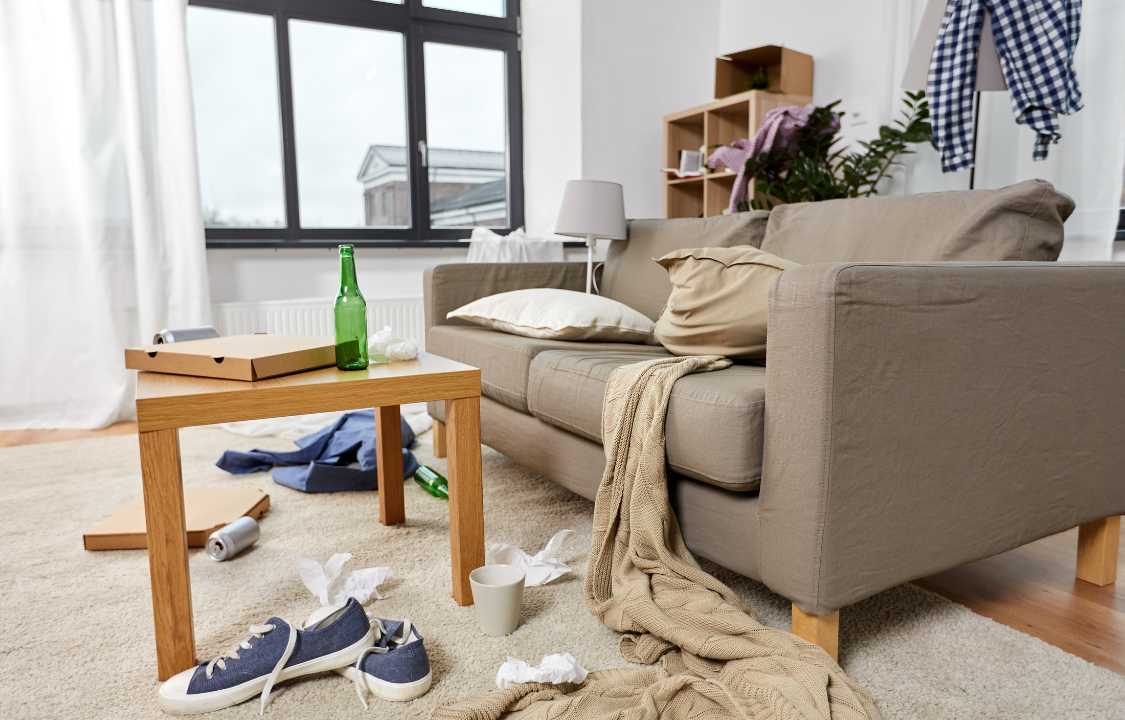Alongside expert-led tips to clear the chaos
Clutter – it’s a universal affliction. Whether it’s those boxes brimming with old phones and tangled cables, closets bursting with clothes that no longer fit, or drawers stuffed with letters and birthday cards from decades past, clutter has a way of creeping into our lives. No matter how diligently we attempt to organize or streamline our living spaces, there are always a few stubborn items that resist eviction. But have you ever stopped to ponder why you cling to these possessions so fervently? The answer, as it turns out, is more profound than you might imagine.
According to Helen Sanderson, MSc, a psychotherapist and professional organizer, clutter can offer unique insights into your personality. She believes that “clutter has a story to tell about its owner.” In her eyes, decluttering isn’t just about tidying up; it’s a journey of self-discovery.
While some may view clutter as a mere inconvenience, for others, it represents a deeper connection to their past, a way of preserving moments, memories, and emotions. To them, possessions are more than just things – they are time capsules that encapsulate their journey, for better or worse.
Meet the Experts
Before we dive into the intriguing world of clutter psychology, let’s introduce the experts who will guide us through this cluttered labyrinth.

Helen Sanderson, MSc
- Psychotherapist and Professional Organizer
- Author of “The Secret Life of Clutter”
- An interior designer with expertise in decluttering
- Renowned clutter expert in the UK
Helen specializes in helping people create well-organized, clutter-free homes while promoting mindfulness and a sense of purpose in life. Her holistic approach uncovers the hidden narratives within our homes and empowers individuals to let go and move forward.

Craig Hoareau
- APDO Member (Association of Professional Declutterers & Organizers)
- Managing Director at A Tidy Mind London
Craig is a proud member of APDO and the owner of A Tidy Mind London, a decluttering service dedicated to transforming people’s homes. His approach combines physical decluttering with mental clutter resolution, providing comprehensive support to clients.
Now that we’ve met our experts, let’s delve into the six most common clutter types and explore what they reveal about your personality. Alongside these insights, Craig Hoareau will share practical decluttering tips to help you conquer chaos once and for all.
1. The Fashion Clutterer – Clothes, Shoes, Jewelry
Do you often find yourself rearranging your wardrobe only to see it descend into chaos within a week? If so, you’re not alone. But have you ever considered what your penchant for accumulating clothes, shoes, and jewelry says about you?
Helen suggests that the fashion clutterer is someone who accumulates items as a form of innocent indulgence. These treats provide comfort and a sense of control, allowing them to experiment with new looks and identities. However, their attachment to fashion can hinder them from letting go of unused or outdated pieces.
Decluttering Tip: Start by categorizing your items. Be realistic about what doesn’t fit, was an impulse purchase, or no longer suits your style. Organize your wardrobe by seasons and type, and consider using slim hangers, wardrobe organizers, storage boxes, and dividers to maximize space. If space is limited, store out-of-season clothes separately and swap them when the season changes. Donate, recycle, or sell items you no longer want to give them a new life.
2. The Childhood Clutterer – Old Toys, Books, Games
Childhood holds a special place in our hearts. For some, it’s a magical time full of enchantment, while for others, it’s a period they long to revisit. The childhood clutterer clings to relics from this time as a way to reconnect with the inner magic or to seek what was lost or missing.
These individuals may view their childhood through rose-tinted glasses, seeing it as a sanctuary in contrast to the challenges of the present. Their attachment to these items is an attempt to retain a sense of innocence and wonder.
3. The Sentimental Clutterer – Cards, Drawings, Knick-Knacks
Meet the most entrenched clutter type. These individuals can narrate a story about every item in their home, reliving each moment in exquisite detail. Sentimentality connects them to a profound loss, whether experienced in childhood or adulthood. Their possessions serve as replacements for something they feel they need. By holding onto these objects, they regain a sense of control over a past where they were powerless.
Decluttering Tip: Overcoming sentimental clutter can be challenging, but start by asking why you’re keeping each item and for whom. Consider creating a memory box with your favorite childhood items, selecting one from each category. Alternatively, create a photo book of your childhood, photographing and scanning your cherished belongings. This allows you to preserve the memories while letting go of the physical items.
4. The Tech Clutterer – Spare Phones, Chargers, Cables
Tech clutterers often grapple with the fear of needing items in the future. They may not be tech-savvy and are haunted by concerns like, “What if I don’t have the right cable?” As a result, drawers and boxes become repositories for decades-old cables and gadgets.
Decluttering Tip: Organize your tech clutter by categorizing items, separating wires by type, and using resealable bags or small containers to keep them tidy. For daily-use items around your desk, explore ways to hide wires to reduce visual clutter. Dispose of old tech by recycling or selling it through online platforms.
5. The Entertainment Clutterer – CDs, DVDs
Similar to sentimental clutterers, entertainment clutterers hold onto old vinyl, video, and cassette tpes as a direct link to a cherished past. They believe that those times were better, and the future seems less promising. Conversations with these individuals often revolve around nostalgia for old films and music.
Decluttering Tip: Start by letting go of items you no longer watch or listen to, especially if they are available on streaming platforms. Consider selling or donating old CDs and DVDs. Organize the remaining items into racks, shelves, storage boxes, or binders to save space and make them easily accessible.
6. The Paper Clutterer – Documentation, Bills, Letters
Paper clutterers are perhaps the most common type. They resist the shift to a paper-free tech-driven world and feel overwhelmed by the sheer volume of detail on each document. For them, paperwork represents authority and communication, triggering anxiety about missing something important.
Decluttering Tip: Begin by categorizing your paperwork into different folders or containers. Create a filing system, either with physical folders or digitally scanned documents. Regularly discard outdated or irrelevant items. When new mail arrives, handle it promptly – take action, file it, or discard it immediately to avoid accumulating piles of paperwork.
As you embark on your decluttering journey, armed with insights into your clutter type, remember that your home’s apparent chaos holds deeper significance than meets the eye. Clutter is not merely an inconvenience; it’s a reflection of your past, your emotions, and your need for control. Embrace the process of decluttering, and as you sift through your possessions, ponder the profound insights they offer.
Who would have thought that the seemingly meaningless mess in our homes could harbor such rich narratives? So, roll up your sleeves, dive into those cluttered boxes, and discover the hidden stories waiting to be uncovered. If you need us, we’ll be right there with you, navigating the journey through clutter to clarity.

